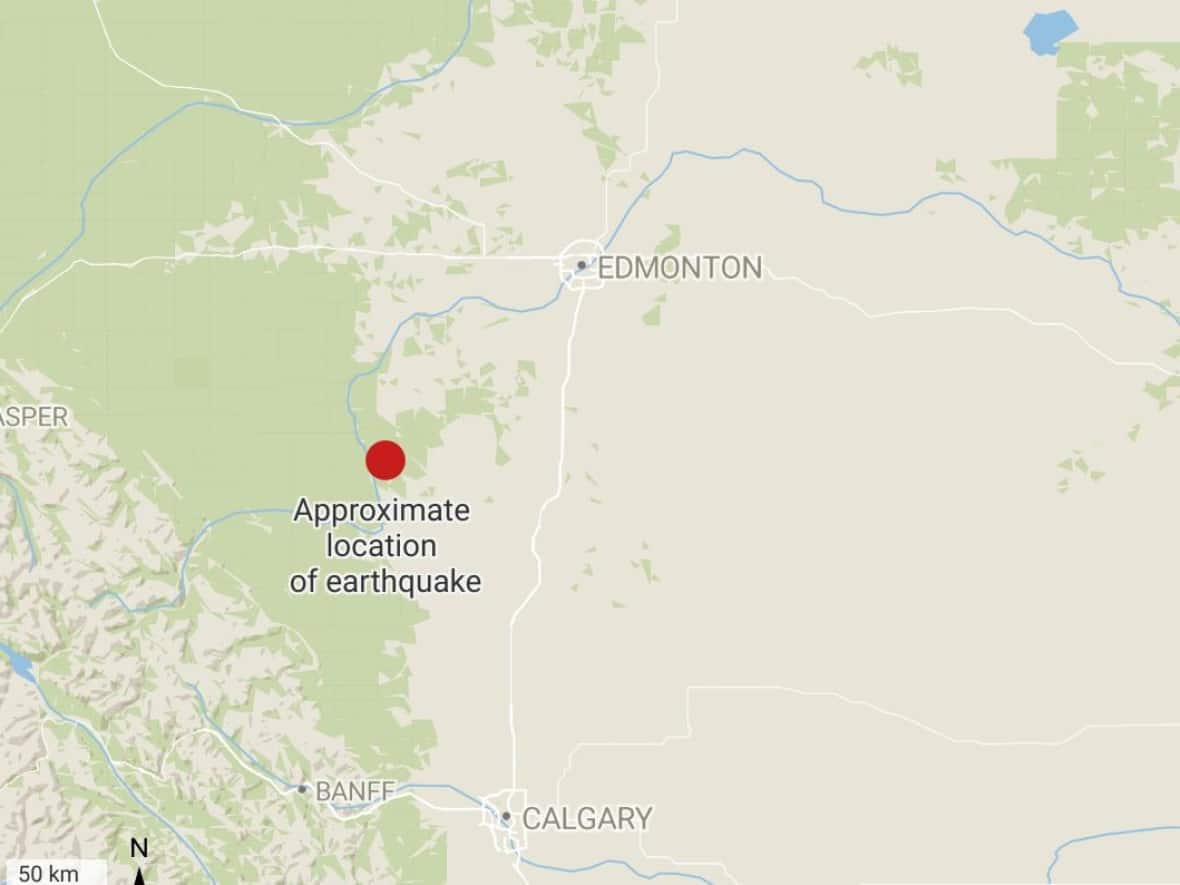Earthquake that shook western Alberta was 2nd-largest ever in province

An earthquake that shook west-central Alberta Wednesday night was not caused by industrial activity, the Alberta Energy Regulator says.
Initially recorded as a 4.1-magnitude earthquake, Natural Resources Canada upgraded it to a 5.0-magnitude quake, making it the second largest in Alberta since reporting began.
An investigation determined the tremors recorded near Rocky Mountain House were not induced by fracking or any other oil and gas activity, an AER spokesperson told CBC News.
"The earthquake occurred at approximately nine kilometres below the surface, which indicates that it occurred naturally," AER said in a statement Thursday.
"In Alberta, earthquakes that are induced by energy development typically occur between four and five kilometres below the surface."
WATCH | A professor talks about how this earthquake shapes up against others in the province:
According to Natural Resources Canada, the earthquake was detected at 9:23 p.m. MT, about 37 kilometres north-northwest of Rocky Mountain House, a town 215 kilometres southwest of Edmonton.
The department said the earthquake was lightly felt and there was no reported damage as of 10 p.m.
The magnitude of the quake was a preliminary report that may change as more data comes in.
Alberta earthquake
The tremor is visible on the wave from seismograph from the Edmonton station and the agency's community internet intensity map shows multiple reports from the Edmonton region as well as some in the Rocky Mountain House and Red Deer areas.
Earthquakes are unusual in the area but not unheard of, said Jeff Gu, a seismological researcher with the University of Alberta.
"It is fairly sizable in this area, even though there have been many earthquakes occurring along the Rocky Mountain foothills," Gu said in an interview Thursday. "It's on the larger size."
A complex history
Gu said the region has a complex history for seismic activity and said the latest quake should prompt further study in the area.
"I think that this is worth investigating in the next weeks or months and potentially even having more instruments down in that area to have better data," Gu said in an interview with CBC Radio's Edmonton AM.
"In fact, this area is very complicated. It's got a history of a variety of different earthquakes.
"It's got natural earthquakes occurring near the Rocky Mountains, and they're usually at slightly deeper depths, 10 kilometres or so.
"And then there have been earthquakes linked to gas extraction, as early as the 1980s."

Natural Resources data detailing the largest earthquakes in the region shows the area has been shaken before.
The most powerful earthquakes in the region were recorded in the past decade. One in 2015 and two others in 2019 were all measured at 4.6 in magnitude.
The timing of earthquakes can provide critical clues to the cause, Gu said.
While earthquakes triggered by fracking are "almost instantaneous" it can take years for industrial activities that inject waste-water into the ground to trigger any tremors, he said.
"Those can take a lag of months to years until an earthquake can happen, until the build-up in the stress can really break the camel's back."
Moderate earthquakes rare in Alberta
Gu said moderate quakes always cause a stir in the scientific community.
"It sounds wrong to say that we're excited about earthquakes, but as long as it's an earthquake that does not cause damage, yeah, we're very happy because they can tell us so much about the underground conditions, the stress and the causes of these events."
While Alberta has been historically seismically quiet, activity has been steadily increasing since the late 1970s.
Seismic events in Alberta tend to be between micro (zero magnitude) and minor (three magnitude) in size. Moderate earthquakes with a magnitude greater than four are more rare, the AER says on its website.
The biggest earthquake ever recorded in Alberta was measured at 5.4 magnitude on April 14, 2001, 40 kilometres northeast of Dawson Creek, B.C., near the B.C.-Alberta border.
The largest earthquake in Alberta triggered by industrial activity was measured at 4.8 magnitude, on January 12, 2016, 35 kilometres west of Fox Creek.

 Yahoo Movies
Yahoo Movies 
